译林版初中英语介词用法及中考考点分析
- 格式:doc
- 大小:38.00 KB
- 文档页数:2
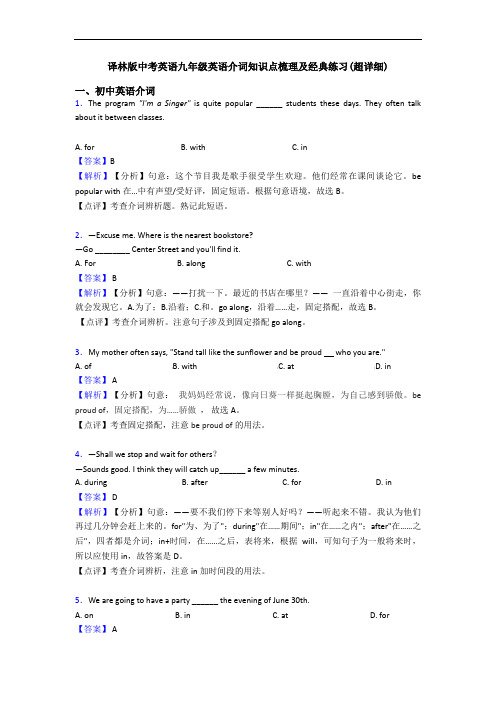
译林版中考英语九年级英语介词知识点梳理及经典练习(超详细)一、初中英语介词1.The program "I'm a Singer"is quite popular ______ students these days. They often talk about it between classes.A. forB. withC. in【答案】B【解析】【分析】句意:这个节目我是歌手很受学生欢迎。
他们经常在课间谈论它。
be popular with在…中有声望/受好评,固定短语。
根据句意语境,故选B。
【点评】考查介词辨析题。
熟记此短语。
2.—Excuse me. Where is the nearest bookstore?—Go ________ Center Street and you'll find it.A. ForB. alongC. with【答案】 B【解析】【分析】句意:——打扰一下。
最近的书店在哪里?——一直沿着中心街走,你就会发现它。
A.为了;B.沿着;C.和。
go along,沿着……走,固定搭配,故选B。
【点评】考查介词辨析。
注意句子涉及到固定搭配go along。
3.My mother often says, "Stand tall like the sunflower and be proud who you are." A. of B. with C. at D. in【答案】 A【解析】【分析】句意:我妈妈经常说,像向日葵一样挺起胸膛,为自己感到骄傲。
be proud of,固定搭配,为……骄傲,故选A。
【点评】考查固定搭配,注意be proud of的用法。
4.—Shall we stop and wait for others?—Sounds good. I think they will catch up______ a few minutes.A. duringB. afterC. forD. in【答案】 D【解析】【分析】句意:——要不我们停下来等别人好吗?——听起来不错。
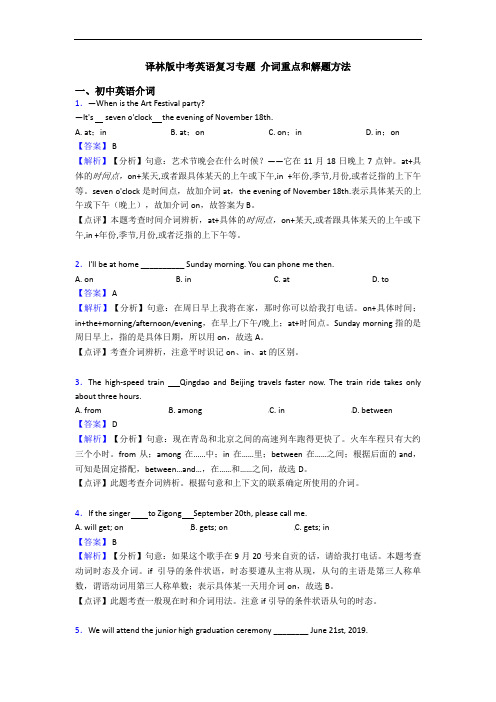
译林版中考英语复习专题介词重点和解题方法一、初中英语介词1.—When is the Art Festival party?—It's seven o'clock the evening of November 18th.A. at;inB. at;onC. on;inD. in;on【答案】 B【解析】【分析】句意:艺术节晚会在什么时候?——它在11月18日晚上7点钟。
at+具体的时间点,on+某天,或者跟具体某天的上午或下午,in +年份,季节,月份,或者泛指的上下午等。
seven o'clock是时间点,故加介词at,the evening of November 18th.表示具体某天的上午或下午(晚上),故加介词on,故答案为B。
【点评】本题考查时间介词辨析,at+具体的时间点,on+某天,或者跟具体某天的上午或下午,in +年份,季节,月份,或者泛指的上下午等。
2.I'll be at home __________ Sunday morning. You can phone me then.A. onB. inC. atD. to【答案】 A【解析】【分析】句意:在周日早上我将在家,那时你可以给我打电话。
on+具体时间;in+the+morning/afternoon/evening,在早上/下午/晚上;at+时间点。
Sunday morning指的是周日早上,指的是具体日期,所以用on,故选A。
【点评】考查介词辨析,注意平时识记on、in、at的区别。
3.The high-speed train Qingdao and Beijing travels faster now. The train ride takes only about three hours.A. fromB. amongC. inD. between【答案】 D【解析】【分析】句意:现在青岛和北京之间的高速列车跑得更快了。
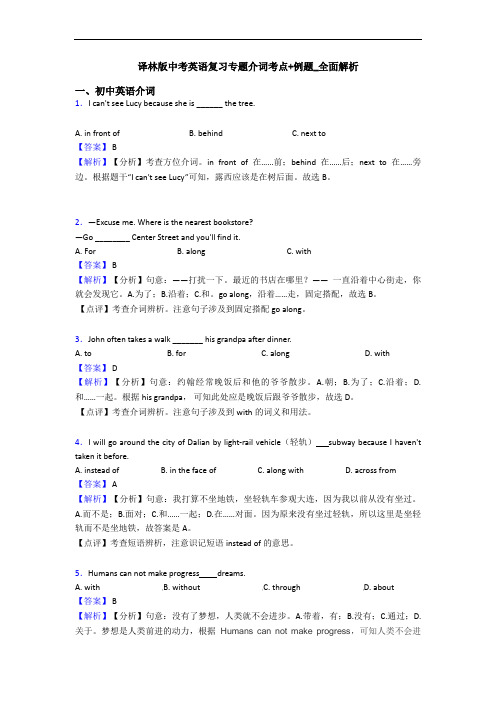
译林版中考英语复习专题介词考点+例题_全面解析一、初中英语介词1.I can't see Lucy because she is ______ the tree.A. in front ofB. behindC. next to【答案】 B【解析】【分析】考查方位介词。
in front of在……前;behind在……后;next to在……旁边。
根据题干“I can't see Lucy”可知,露西应该是在树后面。
故选B。
2.—Excuse me. Where is the nearest bookstore?—Go ________ Center Street and you'll find it.A. ForB. alongC. with【答案】 B【解析】【分析】句意:——打扰一下。
最近的书店在哪里?——一直沿着中心街走,你就会发现它。
A.为了;B.沿着;C.和。
go along,沿着……走,固定搭配,故选B。
【点评】考查介词辨析。
注意句子涉及到固定搭配go along。
3.John often takes a walk _______ his grandpa after dinner.A. toB. forC. alongD. with【答案】 D【解析】【分析】句意:约翰经常晚饭后和他的爷爷散步。
A.朝;B.为了;C.沿着;D.和……一起。
根据his grandpa,可知此处应是晚饭后跟爷爷散步,故选D。
【点评】考查介词辨析。
注意句子涉及到with的词义和用法。
4.I will go around the city of Dalian by light-rail vehicle(轻轨) subway because I haven't taken it before.A. instead ofB. in the face ofC. along withD. across from【答案】 A【解析】【分析】句意:我打算不坐地铁,坐轻轨车参观大连,因为我以前从没有坐过。
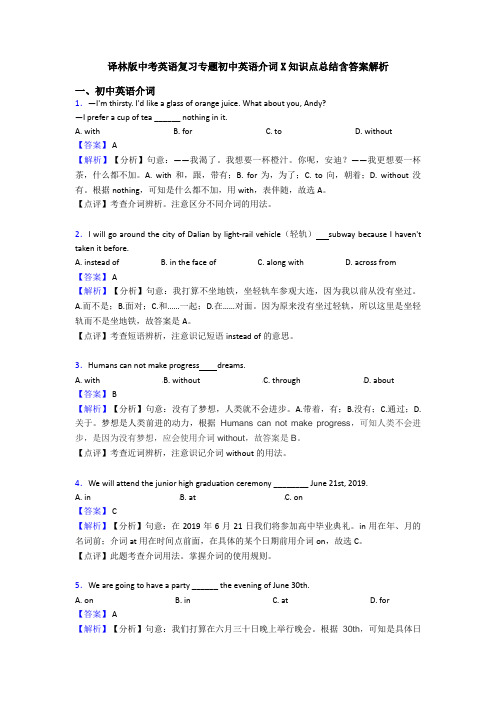
译林版中考英语复习专题初中英语介词X知识点总结含答案解析一、初中英语介词1.—I'm thirsty. I'd like a glass of orange juice. What about you, Andy?—I prefer a cup of tea ______ nothing in it.A. withB. forC. toD. without【答案】 A【解析】【分析】句意:——我渴了。
我想要一杯橙汁。
你呢,安迪?——我更想要一杯茶,什么都不加。
A. with 和,跟,带有;B. for 为,为了;C. to 向,朝着;D. without 没有。
根据nothing,可知是什么都不加,用with,表伴随,故选A。
【点评】考查介词辨析。
注意区分不同介词的用法。
2.I will go around the city of Dalian by light-rail vehicle(轻轨) subway because I haven't taken it before.A. instead ofB. in the face ofC. along withD. across from【答案】 A【解析】【分析】句意:我打算不坐地铁,坐轻轨车参观大连,因为我以前从没有坐过。
A.而不是;B.面对;C.和……一起;D.在……对面。
因为原来没有坐过轻轨,所以这里是坐轻轨而不是坐地铁,故答案是A。
【点评】考查短语辨析,注意识记短语instead of的意思。
3.Humans can not make progress dreams.A. withB. withoutC. throughD. about【答案】 B【解析】【分析】句意:没有了梦想,人类就不会进步。
A.带着,有;B.没有;C.通过;D.关于。
梦想是人类前进的动力,根据Humans can not make progress,可知人类不会进步,是因为没有梦想,应会使用介词without,故答案是B。
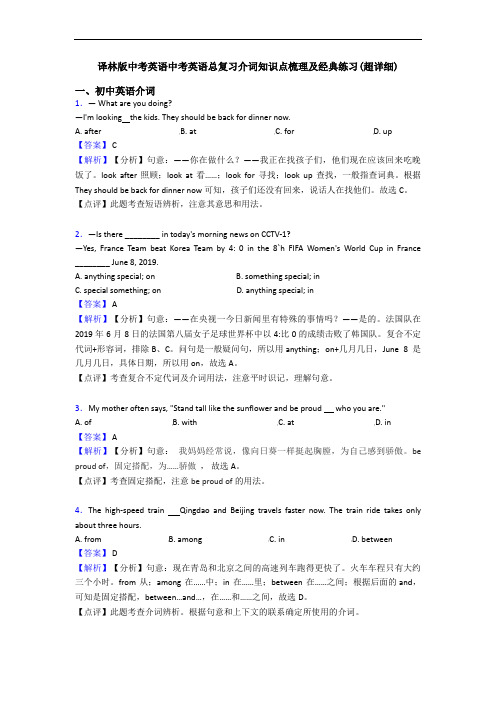
译林版中考英语中考英语总复习介词知识点梳理及经典练习(超详细)一、初中英语介词1.— What are you doing?—I'm looking the kids. They should be back for dinner now.A. afterB. atC. forD. up【答案】 C【解析】【分析】句意:——你在做什么?——我正在找孩子们,他们现在应该回来吃晚饭了。
look after 照顾;look at 看……;look for 寻找;look up 查找,一般指查词典。
根据They should be back for dinner now可知,孩子们还没有回来,说话人在找他们。
故选C。
【点评】此题考查短语辨析,注意其意思和用法。
2.—Is there ________ in today's morning news on CCTV-1?—Yes, France Team beat Korea Team by 4: 0 in the 8`h FIFA Women's World Cup in France ________ June 8, 2019.A. anything special; onB. something special; inC. special something; onD. anything special; in【答案】 A【解析】【分析】句意:——在央视一今日新闻里有特殊的事情吗?——是的。
法国队在2019年6月8日的法国第八届女子足球世界杯中以4:比0的成绩击败了韩国队。
复合不定代词+形容词,排除B、C。
问句是一般疑问句,所以用anything;on+几月几日,June 8 是几月几日,具体日期,所以用on,故选A。
【点评】考查复合不定代词及介词用法,注意平时识记,理解句意。
3.My mother often says, "Stand tall like the sunflower and be proud who you are." A. of B. with C. at D. in【答案】 A【解析】【分析】句意:我妈妈经常说,像向日葵一样挺起胸膛,为自己感到骄傲。
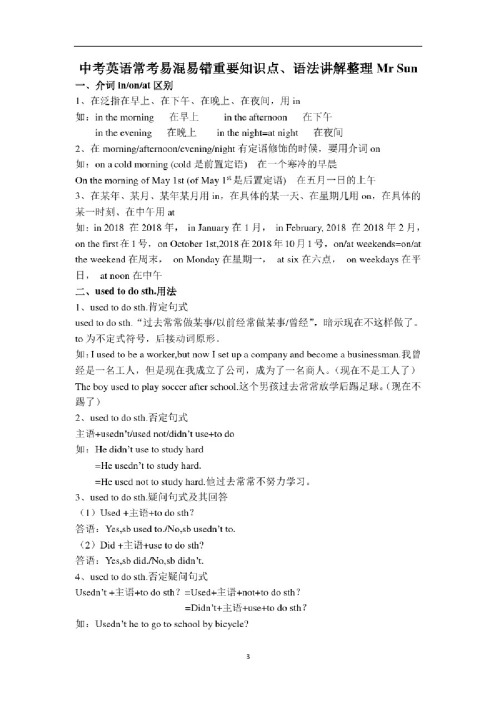
中考英语常考易混易错重要知识点、语法讲解整理Mr Sun一、介词in/on/at区别1、在泛指在早上、在下午、在晚上、在夜间,用in如:in the morning在早上in the afternoon在下午in the evening在晚上in the night二at night在夜间2、在morning/afternoon/evening/night有定语修饰的时候,要用介词on如:on a cold morning(cold是前置定语)在一个寒冷的早晨On the morning of May1st(of May1"是后置定语)在五月一日的上午3、在某年、某月、某年某月用in,在具体的某一天、在星期儿用。
n,在具体的某一时刻、在中午用at如:in2018在2018年,in January在1月,in February,2018在2018年2月,on the first在1 号,on October1st,2018在2018年10月1号,on/at weekends=on/at the weekend在周末,on Monday在星期一,at six在六点,on weekdays在平日,at noon在中午二、used to do sth.用法1、used to do sth.肯定句式used to do sth.“过去常常做某事/以前经常做某事/曾经”,暗示现在不这样做了。
to为不定式符号,后接动词原形。
如:I used to be a worker,but now I set up a company and become a businessman.It曾经是一名工人,但是现在我成立了公司,成为了一名商人。
(现在不是工人了)The boy used to play soccer after school.这个男孩过去常常放学后踢足球。
(现在不踢了)2、used to do sth.否定句式iin+usedift/used not/didn't use+to do如:He didn't use to study luird=He usedn't to study hard.=He used not to study hard.他过去常常不努力学习。
译林版中考英语复习专题常见初中英语介词最全总结含答案解析一、初中英语介词1.Our class are much sure to win the basketball game ______ Class Three.A. ofB. inC. againstD. from【答案】C【解析】【分析】句意:我们班肯定能赢得和三班之间的篮球赛。
A. ……的,B. 在……里C.against 对抗 , D. 从,与……之间的比赛用against。
故选C。
【点评】本题考查介词辨析。
2.Humans can not make progress dreams.A. withB. withoutC. throughD. about【答案】 B【解析】【分析】句意:没有了梦想,人类就不会进步。
A.带着,有;B.没有;C.通过;D.关于。
梦想是人类前进的动力,根据Humans can not make progress,可知人类不会进步,是因为没有梦想,应会使用介词without,故答案是B。
【点评】考查近词辨析,注意识记介词without的用法。
3.My mother often says, "Stand tall like the sunflower and be proud who you are." A. of B. with C. at D. in【答案】 A【解析】【分析】句意:我妈妈经常说,像向日葵一样挺起胸膛,为自己感到骄傲。
be proud of,固定搭配,为……骄傲,故选A。
【点评】考查固定搭配,注意be proud of的用法。
4.The high-speed train Qingdao and Beijing travels faster now. The train ride takes only about three hours.A. fromB. amongC. inD. between【答案】 D【解析】【分析】句意:现在青岛和北京之间的高速列车跑得更快了。
译林版中考英语专项训练介词知识点(大全)一、初中英语介词1.—Could you give me some advice on learning English well?—Sure. But remember nothing can be learned hard work.A. byB. withoutC. through【答案】 B【解析】【分析】句意:——你能给我一些关于学好英语的建议吗?——当然。
但是记住,没有努力,什么都学不到。
A. by通过;B. without没有;C. through通过。
根据句子前面的nothing和后面的hard work,可知双否表示肯定,应用介词without,表“没有努力,什么都学不到”。
故选B。
【点评】考查介词辨析。
注意掌握介词短语without+名词的意思及用法。
2.My English teacher always comes into the classroom ____a smile.A. byB. forC. onD. with【答案】 D【解析】【分析】句意:我英语老师总是带着微笑进入教室。
on "在……之上、在……时候";by "通过、被、由";for"为、为了、对";with "用、带着、和……一起",四者都是介词;表示老师面带微笑进入教室,用with,表伴随,故答案选D。
【点评】考查介词辨析,注意识记with的用法。
3.— New China was set up in 1949.—Every Chinese knows her 70th birthday is ____October 1, 2019.A. inB. atC. onD. by【答案】 C【解析】【分析】句意:——新中国成立于1949年。
—每个中国人都知道她70年的诞生日是在2019年10月1日。
译林版中考英语复习专题介词知识点梳理及经典练习(超详细)一、初中英语介词1.—Bill, did you see Tom?—Yes, he just parked his car here and then hurried the street.A. throughB. overC. pastD. across【答案】 D【解析】【分析】句意:—比尔, 你看见汤姆了吗?—是的,他刚刚把车停在这儿,然后匆忙穿过街道。
A. through穿过(从物体中间穿过);B. over越过(在物体上方,不接触);C. past经过(从旁边经过);D. across穿过(从物体表面横穿),穿过街道应该是从表面穿过,用across。
故选D。
【点评】考查介词辨析。
熟记这些介词的含义。
2.John often takes a walk _______ his grandpa after dinner.A. toB. forC. alongD. with【答案】 D【解析】【分析】句意:约翰经常晚饭后和他的爷爷散步。
A.朝;B.为了;C.沿着;D.和……一起。
根据his grandpa,可知此处应是晚饭后跟爷爷散步,故选D。
【点评】考查介词辨析。
注意句子涉及到with的词义和用法。
3.Humans can not make progress dreams.A. withB. withoutC. throughD. about【答案】 B【解析】【分析】句意:没有了梦想,人类就不会进步。
A.带着,有;B.没有;C.通过;D.关于。
梦想是人类前进的动力,根据Humans can not make progress,可知人类不会进步,是因为没有梦想,应会使用介词without,故答案是B。
【点评】考查近词辨析,注意识记介词without的用法。
4.On sunny days, my grandma often reads a novel ____ the window.A. byB. forC. withD. from【答案】 A【解析】【分析】句意:我奶奶经常在窗子旁边看小说。
译林版中考英语中考英语总复习介词完整归纳一、初中英语介词1.More and more people in Qingdao go to work _________subway now.A. withB. onC. inD. by【答案】D【解析】【分析】句意:现在越来越多的青岛人乘地铁去上班。
A. with 用;B. on 在---上;C. in 在---里;D. by乘;根据on/in+the+交通工具,by+交通工具;故选D。
【点评】考查介词辨析。
根据固定搭配选出正确答案。
2.—Is that your headmaster?—You mean the man ________ blue?A. onB. withC. in【答案】 C【解析】【分析】句意:——那是你的校长吗?——你是指穿着蓝色衣服的男士吗?固定搭配,in+颜色,穿着……颜色衣服的人,A 在……上面,B 和……,表伴随,与题意不符,故选C。
【点评】考查介词辨析,注意in+颜色的用法。
3.We will attend the junior high graduation ceremony ________ June 21st, 2019.A. inB. atC. on【答案】 C【解析】【分析】句意:在2019年6月21日我们将参加高中毕业典礼。
in用在年、月的名词前;介词at用在时间点前面,在具体的某个日期前用介词on,故选C。
【点评】此题考查介词用法。
掌握介词的使用规则。
4.On sunny days, my grandma often reads a novel ____ the window.A. byB. forC. withD. from【答案】 A【解析】【分析】句意:我奶奶经常在窗子旁边看小说。
by通过、被、在附近;for为、为了、对;with用、和……一起;from 来自,从……起,四者都是介词,根据句子结构可知此处是地点状语,by the window,在窗户旁边,故选A。
译林版初中英语介词用法及中考考点分析
介词的搭配能力很强,它可以与名词或代词一起构成介词短语,该名词或代词称为介词宾语。
介词短语在句中可作状语、定语、补语、表语等。
例如:We have lunch at school every day. (作状语)
The girl in the hat is Kate. (作定语)
The students keep their hands behind their backs. (作宾补)
We are in the classroom now. (作表语)
注意下列一些常用介词的用法或区别:
1.in,on,at表示时间的用法。
in + 年、季、月、年月。
on + 月日、日、日(上、下、晚上等)。
at + 时、时分。
例如:
in 2002, in summer, in July,
on Sunday afternoon,on a cold morning in June , on February 12,2001,on Children's Day at twelve o’clock, at half past 2 p.m.
注意:in the morning(afternoon, evening), at noon, at night等为固定用法。
2.in和after区别。
两者都可指“在------之后”。
after常放在表示时间的“某时”或“某刻”的前面;in 常放在一段时间的前面,以现在为起点,表示在“将来一段时间”之后,常用于将来时态中。
例如:The Greens are going to England in three hours. (从现在开始三个小时之后)
The Greens are going to England after three o’clock today. (三点钟以后) 3.besides、except和but .
①besides意思是“除……之外(还有---)”。
例如:They all went there besides Tom.除了汤姆去了以外,他们也都去了。
Besides English we also learn Chinese, French and Japanese.
②except意思是“除……之外(在整体中除去一部分)”。
例如:We all went the Great Wall except Tom.除了汤姆,我们都去了长城。
(汤姆没去)The students go to school every day except Saturday and Sunday.
③but意思是“除……之外(在整体中除去一部分)”,它与except的区别是:but常放在不定代词之后;而except没不是。
例如:I have nothing but a million pound note.
4.by,with,in“通过”,“用”
①表示用“方法、手段”使用by。
例如:We go to school by bike every day。
I live by teaching. 我依靠教书为生。
②表示“用工具”的用with。
例如:We write with pens (or pencils)。
He cut the apple in half with a knife.
③表示“用语言”用in。
例如:He can write a letter in English now.
5.among和between
among(通常用于三个或三个以上)的中间,among后的名词或代词必须是复数,between 用于(二者之间),且“两者”常用and连接。
例如:There is a village among the hills.
Tom is the tallest among these students.
Kate sits between Lucy and Lily.
Switzerland lies between France,Italy,Austria and Germany.
6.across和through
across和through都有“穿过”的意思。
across指从某一物体表面“越过、跨过”(相当于on);through指从物体中间或内部穿过(相当于in)。
例如:I walked across the square to the museum.
We walked through the forest (the door) .
7.on,above,over
①on“在……(表面)上”,指某事物的平面与该事物有直接接触。
例如:There are five books on the desk.
There is a map of China on the wall.
②over指在某事物的垂直上方。
例如:There is a bridge over the river.
③above 指“在……上方”,指一个事物的高度高于另一个事物。
例如:The plane is flying above the clouds.
8.under,below
under与over相反,表示指“在---(垂直)下方”。
below与above相反,指“在……下面”,指某物位置低于另一物。
例如:Our boat went under the bridge.
There is a small town below the hill.
注意:below也可指“(温度)低于---”
例如:The temperature will fall below zero in the night again.
典型例句解析
1.I've got the key ________ the lock.
A.of B.to C.on D.by Key:B [解析] 表示无生命东西的名词的所有关系一般用of构成短语,如:the door of the room。
但题
中的to表示key与lock的一一对应关系。
再如:the answer to the question。
2.They're working ________ the farm.
A.on B.in C.at D.over Key:A [解析]“在农场”应说on a farm,不说in a farm。
3.There is a hole ________ the wall.
A.on B.at C.in D.of Key:C [解析]“在墙上”常说on the wall,但说“墙上有洞”时,应说in the wall。
因为洞深入墙“内部”。
4.The man was killed _________a stone.
A.by B.in C.with D.on Key:C [解析]被动语态中的“被”“由”常由by表示,
例如:The work was finished by Mr. Green.但表示器具时,应用with。
因为器具不能发出动作。